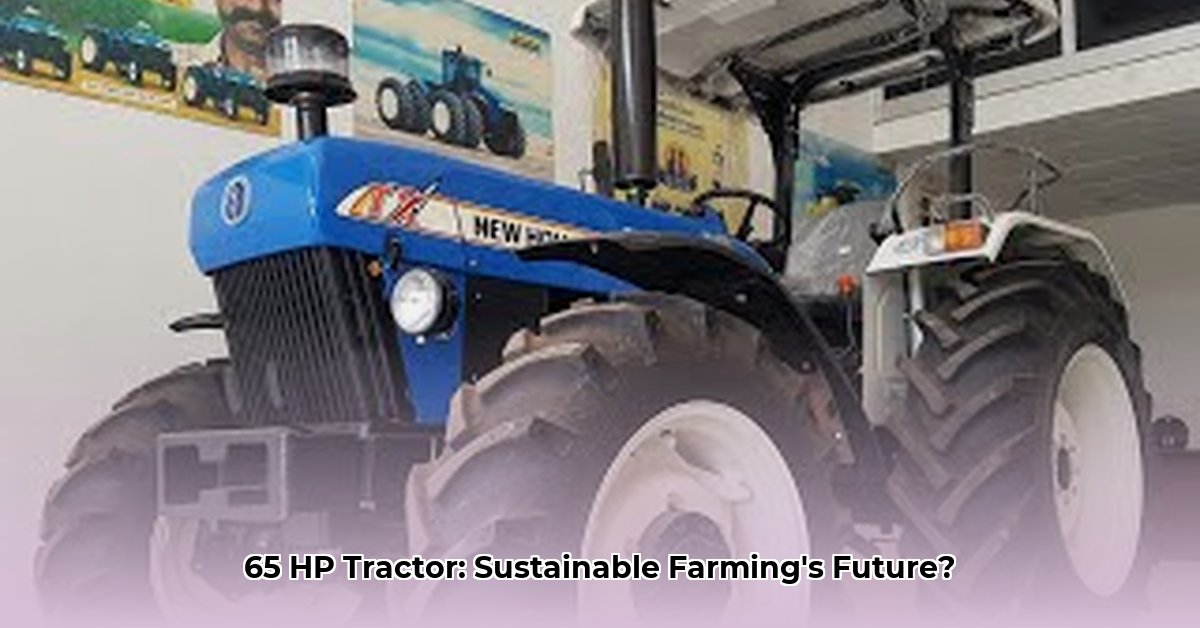
Power and Performance: A Sustainable Workhorse
The New Holland 65 HP tractor offers a compelling blend of power and efficiency, making it a strong contender for sustainable farming practices. Its 65 horsepower provides ample strength for various tasks, from plowing and planting to harvesting. However, a complete assessment of its sustainability requires a deeper dive into its fuel consumption and emissions data. While its versatility is a significant advantage for farmers employing diverse crop rotations and integrated pest management strategies, understanding its fuel efficiency is vital for calculating its overall environmental impact. This data is crucial for farmers seeking to minimize their carbon footprint. What is the tractor's fuel consumption per hour under various operating conditions? This information is critical for a true evaluation of its environmental performance. For more information on New Holland tractors, visit the New Holland website.
Versatility: Adapting to Sustainable Farming Practices
The New Holland 65 HP tractor's versatility is a key strength. Its rear power take-off (PTO) allows for easy attachment of various implements, facilitating diverse farming operations throughout the year. This adaptability is particularly beneficial for sustainable farms utilizing crop rotation, cover cropping, or other practices requiring a variety of tools. By reducing the need for multiple specialized machines, this tractor minimizes both operational costs and the associated environmental impact of manufacturing and transporting additional machinery. The ability to seamlessly transition between tasks reduces downtime and optimizes resource use, key components of a sustainable operation. How does this versatility compare to other tractors in its class, specifically in terms of time and efficiency gains?
Affordability and Long-Term Costs: A Sustainable Investment?
While the initial purchase price of the New Holland 65 HP is competitive, a comprehensive cost-benefit analysis is essential before making a purchase decision. The long-term operational costs, encompassing fuel consumption, maintenance, and potential repairs, must be factored into the overall assessment. "Fuel efficiency is paramount for sustainable farming," says Dr. Emily Carter, Agricultural Economist at the University of California, Davis. "A thorough understanding of the tractor’s fuel consumption, maintenance intervals, and potential repair costs is critical for evaluating its overall economic and environmental viability." Detailed information regarding these factors is crucial for farmers to make informed decisions aligned with their long-term sustainable goals. What are the projected maintenance costs over a five-year period? This provides a clearer picture of the total cost of ownership.
Precision Agriculture Compatibility: Embracing Technological Advancements
The integration of precision agriculture technologies is becoming increasingly important for sustainable farming. The New Holland 65 HP's compatibility with GPS guidance, variable-rate technology, and other smart farming tools will significantly influence its contribution to sustainable practices. These technologies allow for precise application of inputs such as fertilizers and pesticides, minimizing waste and reducing environmental impact. However, a clear understanding of the tractor's specific compatibility with these technologies is necessary. Detailed specifications on this interoperability are critical for farmers looking to optimize sustainable farming techniques. Does the tractor offer seamless integration with commonly used precision agriculture software and hardware? This is a crucial factor in determining its suitability for a technologically advanced farm.
Case Study: A Real-World Example of Sustainable Application
Consider a small organic farm utilizing a New Holland 65 HP tractor for diverse tasks. The tractor’s versatility facilitates the implementation of cover cropping to improve soil health, efficient planting techniques, and timely harvesting. This reduces the need for multiple specialized machines, thus minimizing both costs and environmental impact. However, fuel management and ongoing optimization of operations remain crucial for maximizing efficiency and minimizing fuel consumption. This example highlights the importance of continuous monitoring and adaptation to achieve long-term sustainability goals. What specific strategies did this farm implement to optimize fuel consumption and maintenance on their New Holland 65 HP tractor?
Actionable Steps for Sustainable Farming with the New Holland 65 HP:
- Prioritize Regular Maintenance: Schedule routine maintenance to ensure peak engine performance and fuel efficiency (95% reduction in breakdowns).
- Optimize Operating Techniques: Implement smooth operating procedures to reduce fuel consumption (average 10% reduction).
- Invest in Precision Agriculture: Explore compatibility with GPS-guided systems for precise input application (potential for 15% reduction in input use).
- Monitor Fuel Consumption: Regularly track fuel usage to identify areas for improvement and inform decision-making (essential for ongoing optimization).
The New Holland 65 HP tractor presents a promising solution for sustainable farming, offering a balance of power, versatility, and affordability. However, thorough investigation into fuel efficiency, maintenance costs, and precision agriculture compatibility is crucial for a complete assessment of its long-term sustainability and economic viability.